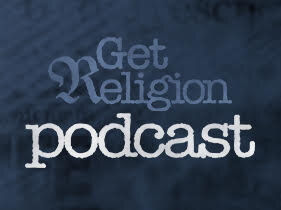Here is a political science question for you, but it’s relevant to an important religion-beat story.
The vice president of the United States is No. 2, in terms of the presidential line of succession, just ahead of the Speaker of the House of Representatives. But in terms of real, day-by-day power, who has more clout in America’s system of government, the vice president or the speaker?

If you have lived and worked on Capitol Hill (as I did for a decade or more), I think you would probably agree that the speaker has more dollars-and-cents clout, as opposed to the largely symbolic “one heartbeat away” status given to the vice president.
With that in mind, let’s turn to an important news story that ran in July at Crux, under this headline: “SF Archbishop says Pelosi can’t call herself a ‘devout Catholic’.” This story was at the heart of the discussion during this week’s “Crossroads” podcast (click here to tune that in). Here is the overture of that piece:
NEW YORK – Archbishop Salvatore Cordileone of San Francisco, the home archdiocese of House Speaker Nancy Pelosi, has insisted that “devout Catholics” can’t support abortion, just after Pelosi had described herself in precisely those terms.
“Let me repeat: No one can claim to be a devout Catholic and condone the killing of innocent human life, let alone have the government pay for it,” Cordileone said in a statement. “The right to life is a fundamental — the most fundamental — human right, and Catholics do not oppose fundamental human rights.”
Hours earlier, at her weekly press conference, Pelosi stated her support for repealing the Hyde Amendment, which prohibits federal funding of abortion, “because it’s an issue of health for many women in America,” and she also emphasized her Catholic faith.
“As a devout Catholic and mother of five in six years, I feel that God has blessed my husband and me with our beautiful family,” Pelosi said. “But it’s not up to me to dictate that’s what other people should do, and it’s an issue of fairness and justice for poor women in our country.”
This leads us to that op-ed by Cordileone that ran the other day at The Washington Post, with this headline: “Our duty to challenge Catholic politicians who support abortion rights.”
Here is the top of that piece. Read carefully and look for an important term that is showing up in more and more statements by some, repeat “some,” U.S. Catholic bishops:
Prominent politicians lost no time in reacting hyperbolically to the Supreme Court’s decision refusing to enjoin Texas’s new law banning abortions after the detection of a fetal heartbeat. President Biden announced a “whole-of-government effort” to find ways to overcome the Texas measure. House Speaker Nancy Pelosi (D-Calif.) denounced the Supreme Court’s refusal as a “cowardly, dark-of-night decision to uphold a flagrantly unconstitutional assault on women’s rights and health,” and promised new legal action: “This ban necessitates codifying Roe v. Wade” in federal law.
As a faith leader in the Catholic community, I find it especially disturbing that so many of the politicians on the wrong side of the preeminent human rights issue of our time are self-professed Catholics. This is a perennial challenge for bishops in the United States: This summer, we provoked an uproar by discussing whether public officials who support abortion should receive the sacrament of the Eucharist. We were accused of inappropriately injecting religion into politics, of butting in where we didn’t belong.
The key term, of course, is “professed” — often paired with “self” to create “self-professed.” In other words, the archbishop is talking about someone who publicly states their conviction that they consider THEMSELVES to be Catholic.
Meanwhile, the term term “devout” implies some kind of measurable standard linked to the practice of the faith. The question is whether that standard is doctrinal or rooted in the practice of the faith. Going to Mass frequently and carrying a rosary equals “devout,” even if the person in question is openly stating his or her rejection — in words and deeds — of centuries of Catholic (or even small-o “orthodox” Christian) teachings.
Who is “devout” and who is “self-professed”?
Here’s another question: Who has the authority to make that judgment? As I said in a GetReligion post last fall, concerning the New York Times (as a symbol of journalistic clout):
There are Christians that the Times team thinks are wonderful and worthy of praise, Christians who embrace the worldview of America’s newspaper of record. There are also bad, even dangerous, Christians who reject the doctrines defended by the Times and some other powerful news institutions. These bad believers — traditionalists in a number of major faiths — should not expect their beliefs to be covered with respect, or even fairness, in news coverage about debates in religious and political life (hello Bill Keller).
There are good Christians and there are bad Christians and, well, some — not all — journalists seem to think that their job is to tell readers who is who.
Sometimes, the newsworthy statements by these “bad” believers will not even be covered at all.
To cut to the chase: I find it very interesting that the Cordileone op-ed at the Post drew, as far as I can tell, next to zero coverage in the mainstream press. This is rather strange, since he is the bishop with sacramental authority (even under the rules of the Theodore McCarrick “doctrine” on this subject) in the home city of Speaker of the House Nancy Pelosi.
So far, the implications of the Post piece have not even been explored by the Post, which has covered these tensions in the past. See this piece, for example: “Pelosi’s archbishop says prominent Catholics who support abortion rights should be denied Communion.”
Why does this silence matter? Well, that calls to mind an image that I use about once a year here at GetReligion. This is another case of “lighthouse” syndrome. Here is how I used that term in a post about religious faith in the life of President Donald Trump. This is all linked to the old Sherlock Holmes story about the dog that didn’t bark.
Pick a metaphor that words for you.
that will work, too. Here is a flashback to that lighthouse tale:
Once there was a man who lived in a lighthouse on the foggy Atlantic. This lighthouse had a gun that sounded a warning every hour. The keeper tended the beacon and kept enough shells in the gun so it could keep firing. After decades, he could sleep right through the now-routine blasts.
Then the inevitable happened. He forgot to load extra shells and, in the dead of night, the gun did not fire.
This rare silence awoke the keeper, who lept from bed shouting, “What was that?”
So here is my question again: Where is the news coverage of the implications of the Post piece? What does this silence mean?
I will carry this further. Many journalists seem to have embraced a conspiracy theory that a pack of conservative Catholic bishops are out to “get” President Biden and that debates about the sacramental status of “self-professed” Catholics are the point on their spear.
It is possible to describe this conflict in another way: Perhaps the story is that the U.S. Catholic bishops disagree with one another on how to define the term “devout,” when it comes to matters of doctrine, practice, sin, repentance and, finally, Holy Communion.
Does Archbishop Cordileone want Speaker Pelosi to repent? It would appear so, after a careful reading of that Washington Post op-ed. Has he attempted to discuss this with Pelosi, acting (under Catholic tradition and canon law) as her bishop?
Is this conflict an important news story?
Enjoy the podcast and, please, pass it along to others.










